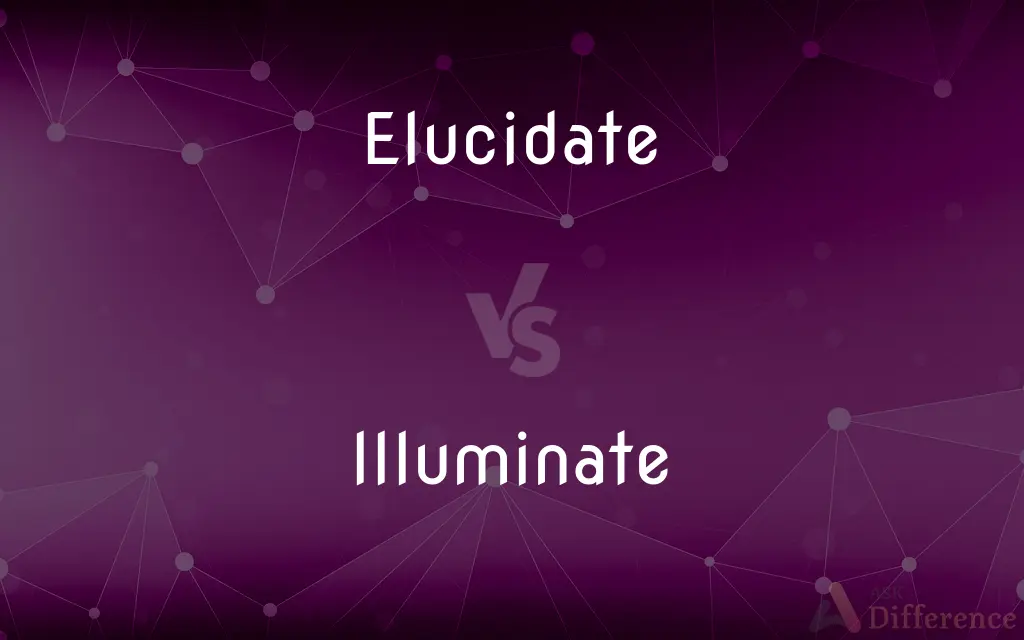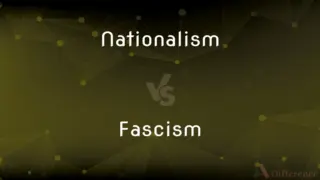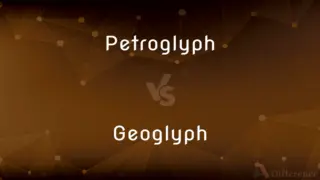Elucidate vs. Illuminate — What's the Difference?
By Tayyaba Rehman & Fiza Rafique — Updated on March 31, 2024
Elucidate means to make something clear or to explain, while illuminate can mean to light up or to clarify intellectually or spiritually.

Difference Between Elucidate and Illuminate
Table of Contents
ADVERTISEMENT
Key Differences
Elucidate involves the process of clarifying, explaining, or making something understandable, especially by providing detailed information or context. Whereas, illuminate has a dual meaning; it can refer to the physical act of casting light on something, making it visible, or metaphorically, to enlighten someone intellectually or spiritually, providing insight or understanding.
When you elucidate a topic, you're breaking down complex information into more comprehensible parts, aiming to increase understanding or resolve confusion. On the other hand, to illuminate something often means to shed light on it in a way that enhances appreciation or understanding, which can be through a literal or figurative enlightening.
Elucidation is primarily used in contexts where detailed explanation or clarification is required, such as academic, scientific, or technical discussions. In contrast, illumination, especially in its metaphorical sense, is used in broader contexts, including education, religion, and the arts, signifying the act of enlightening or revealing deeper meaning.
While elucidation focuses on dispelling ambiguity and making the obscure clear through logical explanation, illumination, especially in a spiritual or intellectual sense, involves not just clarification but also enhancement and enrichment of understanding, often connecting with deeper insights or realizations.
The outcomes of elucidation and illumination differ in their emphasis: elucidation aims for clarity and comprehension of specific information or concepts, whereas illumination aims to bring about an enhanced state of understanding or awareness, which may transcend mere factual knowledge.
ADVERTISEMENT
Comparison Chart
Definition
To make clear or explain
To light up or make clear, either literally or metaphorically
Context
Academic, scientific, technical discussions
Education, religion, arts, personal insight
Purpose
To clarify and resolve confusion
To enlighten or reveal deeper understanding
Method
Detailed explanation, logical analysis
Shedding light, enhancing appreciation or understanding
Outcome
Increased understanding or resolution of ambiguity
Enhanced appreciation, insight, or spiritual enlightenment
Compare with Definitions
Elucidate
To explain complex concepts simply.
The professor elucidated the theory with practical examples.
Illuminate
To cast light on something, making it visible.
The lamp illuminated the dark room.
Elucidate
Focuses on clarity and understanding.
The document elucidated the legal terms.
Illuminate
Metaphorically, to enlighten intellectually or spiritually.
The lecture illuminated aspects of philosophy I hadn't considered.
Elucidate
Often used in academic or technical contexts.
The study elucidated the connection between the variables.
Illuminate
Can imply a revelation or new understanding.
The discussion illuminated the importance of cultural context.
Elucidate
Involves detailed explanation or analysis.
The author elucidated her methodology in the appendix.
Illuminate
Used in a variety of contexts, from literal to figurative.
The exhibit illuminates the artist's creative process.
Elucidate
Aims to dispel confusion or ambiguity.
The briefing elucidated the company's new policy.
Illuminate
Enhances appreciation or understanding.
The book illuminates the complexities of human nature.
Elucidate
To make clear or plain, especially by explanation; clarify.
Illuminate
Light up
A flash of lightning illuminated the house
His face was illuminated by a smile
Elucidate
To explain or clarify something
She gave a one-word answer and refused to elucidate any further.
Illuminate
Decorate (a page or initial letter in a manuscript) with gold, silver, or coloured designs.
Elucidate
(transitive) To make clear; to clarify; to shed light upon.
Illuminate
Help to clarify or explain
A most illuminating discussion
Elucidate
To make clear or manifest; to render more intelligible; to illustrate; as, an example will elucidate the subject.
Illuminate
To provide or brighten with light.
Elucidate
Make clear and (more) comprehensible;
Clarify the mystery surrounding her death
Illuminate
To decorate or hang with lights.
Elucidate
Make free from confusion or ambiguity; make clear;
Could you clarify these remarks?
Clear up the question of who is at fault
Illuminate
To make understandable; clarify
"Cleverly made attacks can ... serve to illuminate important differences between candidates" (New Republic).
Illuminate
To enlighten intellectually or spiritually; enable to understand
"I greatly misdoubt the accuracy of this ... Can you illuminate me?" (Charles Darwin).
Illuminate
To adorn (a page of a book, for example) with ornamental designs, images, or lettering in brilliant colors or precious metals.
Illuminate
To expose to or reveal by radiation.
Illuminate
One who has or professes to have an unusual degree of enlightenment.
Illuminate
(transitive) To shine light on something.
Illuminate
(transitive) To decorate something with lights.
Illuminate
To clarify or make something understandable.
Illuminate
(transitive) To decorate the page of a manuscript book with ornamental designs.
Illuminate
To make spectacular.
Illuminate
(intransitive) To glow; to light up.
Illuminate
(intransitive) To be exposed to light.
Illuminate
To direct a radar beam toward.
Illuminate
Someone thought to have an unusual degree of enlightenment.
Illuminate
(obsolete) enlightened
Illuminate
To make light; to throw light on; to supply with light, literally or figuratively; to brighten.
Illuminate
To light up; to decorate with artificial lights, as a building or city, in token of rejoicing or respect.
Illuminate
To adorn, as a book or page with borders, initial letters, or miniature pictures in colors and gold, as was done in manuscripts of the Middle Ages.
Illuminate
To make plain or clear; to dispel the obscurity to by knowledge or reason; to explain; to elucidate; as, to illuminate a text, a problem, or a duty.
Illuminate
To light up in token or rejoicing.
Illuminate
Enlightened.
Illuminate
One who is enlightened; esp., a pretender to extraordinary light and knowledge.
Illuminate
Make lighter or brighter;
This lamp lightens the room a bit
Illuminate
Make free from confusion or ambiguity; make clear;
Could you clarify these remarks?
Clear up the question of who is at fault
Illuminate
Add embellishments and paintings to (medieval manuscripts)
Common Curiosities
Is elucidation more technical than illumination?
Yes, elucidation is often more technical and detailed, focusing on logical explanation, whereas illumination can be broader, involving spiritual or intellectual enlightenment.
What does it mean to illuminate something?
To illuminate something means to light it up or, figuratively, to clarify and enhance intellectual or spiritual understanding.
How does elucidation differ in purpose from illumination?
Elucidation aims to clarify and resolve confusion, while illumination seeks to enlighten and reveal deeper understanding or insights.
What is a common context for elucidation?
Academic and scientific discussions are common contexts where elucidation is necessary to explain complex ideas or findings.
How can art illuminate personal experiences?
Art can illuminate personal experiences by highlighting emotional depths or insights, offering viewers new ways of seeing and understanding.
Can elucidate and illuminate be used interchangeably?
While both involve clarification, their usage differs based on context—elucidate for detailed explanations, and illuminate for enlightenment or revelation.
What does it mean to elucidate something?
To elucidate something means to make it clear or to explain it in detail, enhancing understanding.
Can a lecture both elucidate and illuminate?
Yes, a lecture can elucidate by explaining complex ideas clearly and illuminate by offering new insights or a deeper understanding of a subject.
What does it mean when a concept is illuminated in a discussion?
When a concept is illuminated in a discussion, it means the discussion has shed light on the concept, offering new perspectives or deeper understanding.
Why is elucidation important in legal documents?
Elucidation is important in legal documents to clarify rights, obligations, and terms, ensuring they are understood by all parties.
How does illumination in a spiritual context differ from academic elucidation?
In a spiritual context, illumination refers to enlightenment and gaining insight into spiritual or existential questions, while academic elucidation focuses on clarifying and explaining specific information or concepts.
Can historical events be illuminated by new research?
Yes, new research can illuminate historical events by uncovering previously unknown details or perspectives, offering a fuller understanding of the past.
How do educators use elucidation and illumination in teaching?
Educators use elucidation to explain and clarify subjects and illumination to inspire or provide insights, aiming to both inform and inspire students.
What role does elucidation play in scientific research?
In scientific research, elucidation is crucial for explaining methodologies, results, and the significance of findings in clear and precise terms.
What is an example of illumination in everyday life?
An example of illumination in everyday life is gaining a sudden understanding or insight into a problem that helps solve it or changes one’s perspective.
Share Your Discovery

Previous Comparison
Nationalism vs. Fascism
Next Comparison
Petroglyph vs. GeoglyphAuthor Spotlight
Written by
Tayyaba RehmanTayyaba Rehman is a distinguished writer, currently serving as a primary contributor to askdifference.com. As a researcher in semantics and etymology, Tayyaba's passion for the complexity of languages and their distinctions has found a perfect home on the platform. Tayyaba delves into the intricacies of language, distinguishing between commonly confused words and phrases, thereby providing clarity for readers worldwide.
Co-written by
Fiza RafiqueFiza Rafique is a skilled content writer at AskDifference.com, where she meticulously refines and enhances written pieces. Drawing from her vast editorial expertise, Fiza ensures clarity, accuracy, and precision in every article. Passionate about language, she continually seeks to elevate the quality of content for readers worldwide.














































